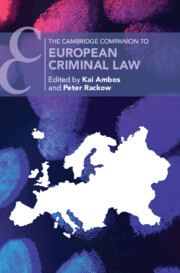Book contents
- The Cambridge Companion to European Criminal Law
- Cambridge Companions to Law
- The Cambridge Companion to European Criminal Law
- Copyright page
- Contents
- Notes on Contributors
- Preface
- Table of Cases
- Abbreviations
- Part I Foundations of European Criminal Law
- 1 European Union and Council of Europe
- 2 The European Court System and Its Role in Shaping European Criminal Law
- Part II Purposes and Principles
- Part III European Substantive Criminal Law
- Part IV European Criminal Procedure
- Part V Institutions
- Part VI Perspectives
- Bibliography
- Index
- References
1 - European Union and Council of Europe
Special Focus on Criminal Law
from Part I - Foundations of European Criminal Law
Published online by Cambridge University Press: 09 February 2023
- The Cambridge Companion to European Criminal Law
- Cambridge Companions to Law
- The Cambridge Companion to European Criminal Law
- Copyright page
- Contents
- Notes on Contributors
- Preface
- Table of Cases
- Abbreviations
- Part I Foundations of European Criminal Law
- 1 European Union and Council of Europe
- 2 The European Court System and Its Role in Shaping European Criminal Law
- Part II Purposes and Principles
- Part III European Substantive Criminal Law
- Part IV European Criminal Procedure
- Part V Institutions
- Part VI Perspectives
- Bibliography
- Index
- References
Summary
European Criminal Law in fact includes EU Law, influenced by European institutions and stemming from Member States agreements. At the same time, it is Council-of-Europe–inspired Law be it through minimum guarantees by the ECHR or through the European Court of Human Rights’ (ECtHR) influence on national criminal laws and procedures. Yet, one searches in vain for a European Criminal Code. Against the rumor that in consequence, European Criminal Law as such does not exist, the first chapter seeks to put up the umbrella and discuss and reveal sources and resources of current European Criminal Law and the intersections of EU Law on the one side and Council-of-Europe–inspired Law on the other side. That will in the end offer a panoramic view constituting European Criminal Law as the sum of European Union law imposing sanctions applicable in all Member States together with (Europeanised) national criminal law influenced by European law and Council-of-Europe inspired and set against European institutions and instruments that aim at ensuring effective criminal prosecution.
Keywords
- Type
- Chapter
- Information
- The Cambridge Companion to European Criminal Law , pp. 3 - 29Publisher: Cambridge University PressPrint publication year: 2023



